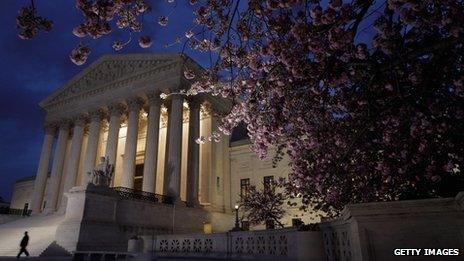What if Supreme Court strikes down Obama healthcare act?
- Published
- comments

The Supreme Court is made up of nine justices, five were appointed by Republican presidents and four by Democrats
You have to feel for Donald Verrilli Jr.
He might go down in history as the man who allowed President Obama's proudest achievement be to sentenced to death, without an adequate defence, external.
The solicitor general was given the job of persuading the Supreme Court that the president's major overhaul of American healthcare is indeed legal. As one judge said, he had a heavy burden to prove, external.
Mr Verrilli didn't really even manage a little light lifting. You might have expected some lofty rhetoric designed to ring down the ages, and prove that compulsory universal health insurance is not in conflict with the constitution.
You would at least presume some ready retorts to the most predictable legal arguments. But he coughed and floundered, to the dismay of bloggers who back the law, external.
The White House has said, external that it has every confidence in him. It was that bad.
Bright side?
Many assume the court will rip the heart out, external of "Obamacare", when it rules in June. They may be wrong. It is not always easy predicting judges' verdicts from their demeanour and questions.
But if the Supreme Court did overturn the president's most significant domestic achievement it would have huge political ramifications. The changes are important in themselves but also have immense political symbolism.
For the political right, the bill stands as a prime example of what they see as the intrusive, overbearing government nourished by President Obama.
For the left, universal healthcare has been a dream since Teddy Roosevelt set up the Progressive Party 100 years ago, external.
President Obama had to fight a gruelling political battle to get the plan through Congress and spent a huge amount of political capital doing so.
To see it ruled illegal would be devastating. A humiliation. A defeat. It would enrage Democrats.
President Obama could always expand the size of the court and pack it with his own people. Oh, wait, that plan didn't work too well, external for FDR in the 1930s.
If he won't follow Franklin Roosevelt's aggressive reaction to defeat by the court, the current president might feel like agreeing with FDR when he said he believed in "the constitution as I understand it, flexible enough to meet any new problem of democracy - not the kind of constitution your court has raised up as a barrier to progress and democracy".
But surprisingly, a number of people are putting a very brave face on the possibility of defeat. They argue in the long run it might help the president in November's election.
The "always look on the bright side" argument is lead by former Clinton strategist, the always entertaining James Carville, external.
He says, external: "I honestly believe - this is not spin. I think that this will be the best thing to ever happen to the Democratic Party because healthcare costs will escalate unbelievably…
"The Republican Party will own the healthcare system for the foreseeable future. And I really believe that, that is not spin."
More radical
A Democrat strategist I've spoken to, who is often consulted by the White House, agrees.
He says that it "gives something for Obama to fight for", arguing that taking healthcare away from young people and those with pre-existing conditions will produce a series of heart-rending stories, which will paint the Republicans as the bad guys, unwilling to do something about a very real problem.

The solicitor general has been criticised from left and right for his defence of the healthcare bill
He adds that defeat might make Democrats more radical and argue that what is called here a "single payer system" - a tax-funded national health system as we have in the UK - is the only real answer, rather than President Obama's market-sensitive half-way house.
I am sure this last point is right. I am less certain that defeat would play well for President Obama.
In a campaign it is of little use claiming the moral high ground, only to admit your plans have been shredded and there is nothing you can do about it.
Impotency is not attractive. Polls suggest around 70% of voters are against his changes, so it doesn't make an obvious centrepiece to the campaign anyway.
What an adverse ruling would prove to voters is the limits of presidential power in America, and reinforce a view that Washington is better at stopping things happening, than coming up with solutions.
UPDATE, 29 March: A number of you have questioned my suggestion that around 70% of Americans were against President Obama's healthcare reforms, and asked what poll I am looking at. I was struck by this very specific poll from CBS, external.
They write: "38% say the entire law should be abolished, according the poll, conducted March 21-25. Another 29% would like the high court to strike down only the requirement that nearly all Americans obtain health insurance if they do not have it."
That's 67% against the whole thing, or its key provision. But I fully accept that most polls are more evenly balanced (while showing a majority against) and I should have reflected that. My main point, that it is not an ideal campaign issue for Obama, remains.